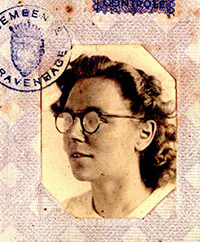
By the time I had the privilege of meeting Diet Eman, she was a woman who reminded me of my own grandmother: relatively short, with a crown of white hair, a sparkle in her eye, and a solid Dutch accent in her speech. She was friendly, humble, and happy – just a lovely person.
But there was more to Diet Eman than met the eye; she was also a woman with an amazing story, who had shown remarkable courage and repeatedly risked her freedom and her life in defense of Dutch Jews during the Nazi occupation of the Netherlands in World War II.
Diet was a young woman when the war came to the Netherlands – 20 years old, engaged to be married to Hein Sietsma, and no doubt dreaming of what the future might bring: a happy life together with Hein, children, and all the experiences of adult life. But the war would force a change in all of her plans. Diet, Hein, his brother Henk, and a number of their friends formed an underground resistance group called Group Hein – named for Hein Sietsma, but also an acronym of the words “Helpt Elkander In Nood”: help each other in need.
Diet spent several years dedicated to the dangerous work of hiding Jews and resisting the Nazi occupation of her home country, and she did so at great personal cost: of the sixteen original members of her resistance group, eight died in prison, by execution, or in concentration camps. Her fiancé, Hein, was arrested in early 1944 and eventually died while imprisoned in Dachau. Diet herself was imprisoned in the Vught concentration camp for a number of months in 1944, managed to convince the Germans to release her, and then immediately went back to resistance work. She would survive the war, but never married. After many years, she was finally able to talk about her experiences, and eventually wrote a memoir of her wartime activities called Things We Couldn’t Say. Her story is also recounted in the documentary The Reckoning, which tells the story of the Dutch Resistance (a portion of which is shown in the video below).
In 2015, Diet Eman became the 9th recipient of the Faith and Freedom Award from the Acton Institute, which was presented to her at our 25th Anniversary Dinner that fall. Upon receiving the award, she had this to say:
I want to say, you think it’s something special. But when your country is taken – and Hitler had said he would respect our neutrality, and then he marches in and he starts killing all of the Jews – and we had so very many Jewish people in our country. So, you would have done the same there, when you had friends who were Jewish and they were in danger. So, I don’t think it’s anything special. But I appreciate it very, very much.
Our President, Rev. Robert A. Sirico, often quotes the parable of the talents when he speaks at Acton events. And I can’t help but think of that parable when I reflect on the life of Diet Eman. In a way, she wasn’t all that special – she was just a regular Dutch girl from a regular Dutch family; no one would have thought of her as being marked for greatness or heroism. But when dark times came and her conscience compelled her to take a stand, she used the gifts that she had been given by God – her strength, her intelligence, her very life – and put them to work, sacrificially defending those who could not defend themselves.
On Tuesday, Diet Eman passed away at the age of 99. And while she received many well-deserved accolades over the years for her work during the war, I imagine that they all pale in comparison to the one she received when, reunited with her beloved Hein, she heard her Savior say, “Well done, good and faithful servant; come, and enter into the joy of your master.”
Read more about Diet Eman and her fiancé Hein Sietsma at the Yad Vashem World Holocaust Remembrance Center.

